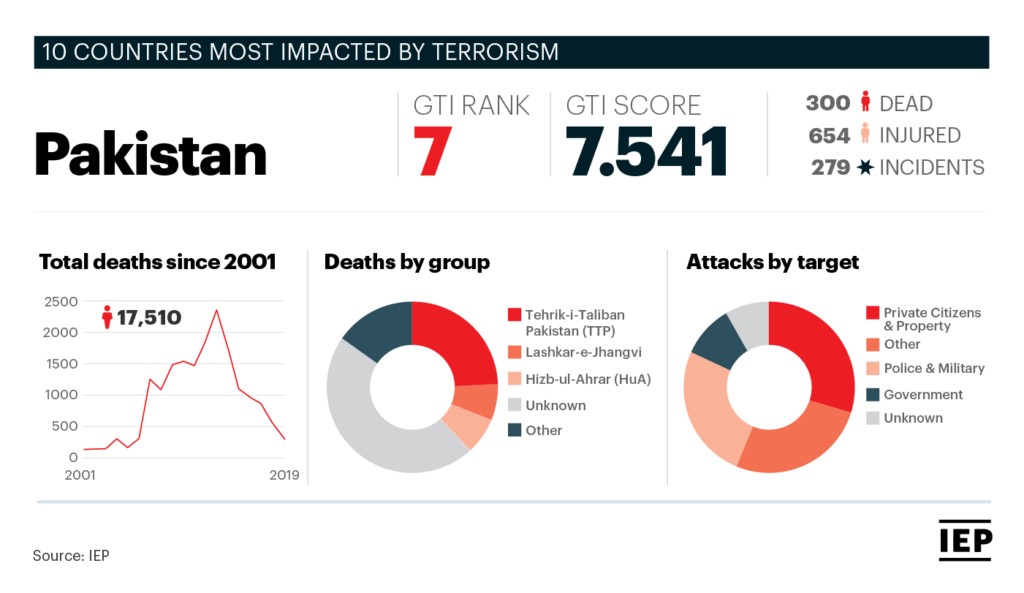AI Generated Summary
- The group’s narrative is steeped in religious prophecy, framing their struggle as the Ghazwa-e-Hind (Battle of India), a foreboding event prophesied in Islamic tradition.
- The return of the Taliban to power in Afghanistan in 2021 was seen by Islamabad as a potential ally.
- Simultaneously, Pakistan grapples with violence from the Tehrik-e-Taliban Pakistan (TTP), an offshoot of the Afghan Taliban with leadership rooted in Pakistan.
The intertwined nature of Pakistan’s political and economic woes with its inconsistent approach to terrorism reveals a deeply rooted crisis. For decades, Pakistan has selectively allowed certain terrorist groups to operate while aggressively targeting others. This inconsistent strategy has not only fostered militancy but also attracted foreign sanctions due to terrorist financing, thereby deterring vital investments. Public sympathy for jihadis, pervasive within law enforcement and intelligence agencies, coupled with political inaction, has enabled domestic militant groups to flourish with relative impunity. Without a strategic overhaul, Islamabad risks spiraling into a full-blown insurgency and further deteriorating its global standing.
The origins of Islamist and sectarian violence in Pakistan trace back to the early 1990s, following the Soviet-Afghan War. Inspired by the success of the Afghan mujahideen, Pakistan’s security apparatus mobilized similar ideologically driven groups to challenge India over the disputed region of Kashmir. These jihadists not only engaged in the Afghan civil war from 1992 to 1996 but also allied with the Taliban post-2001. Pakistan’s strategy was initially aimed at breaking the Kashmir deadlock and bolstering its allies in Afghanistan. However, this approach inadvertently transformed Pakistan into a battleground for competing radical Islamist ideologies.
Over the past three decades, Pakistan has both supported and tolerated various jihadi factions while simultaneously participating in the U.S.-led war on terror. This precarious balancing act has eroded Pakistan’s international reputation and provoked attacks on its military and security forces. The return of the Taliban to power in Afghanistan in 2021 was seen by Islamabad as a potential ally. However, the renewed Taliban regime has proven to be less cooperative, clashing with Pakistani border guards and criticizing Pakistan’s policies toward Afghan refugees.

Simultaneously, Pakistan grapples with violence from the Tehrik-e-Taliban Pakistan (TTP), an offshoot of the Afghan Taliban with leadership rooted in Pakistan. The TTP has been responsible for numerous attacks, including the January mosque bombing, and aims to overthrow the government to establish an Islamic emirate. The group’s narrative is steeped in religious prophecy, framing their struggle as the Ghazwa-e-Hind (Battle of India), a foreboding event prophesied in Islamic tradition.
Pakistan’s security services and political figures, including Khan, have advocated for a nuanced approach towards the TTP and similar militant groups. They argue that these organizations reflect genuine Islamic aspirations and need not be adversarial to Pakistan. However, history has shown that negotiating with violent, radical groups is futile. Just as Afghan Taliban hard-liners cite their faith as a reason for their uncompromising stance, the TTP similarly justifies its militancy through Islamic doctrine. Internal factionalism further entrenches these groups in their extremist positions.
Decades of contradictory policies have significantly hampered Pakistan’s efforts to combat Islamist militancy. Former President Pervez Musharraf openly acknowledged the cultivation and training of Kashmiri militants and support for armed proxies in Afghanistan. He also admitted that figures like Osama bin Laden were revered in Pakistan. While selectively cracking down on certain groups, his administration often backed off, fostering an environment where some militant factions could thrive.
This selective approach has had dire consequences. Since 2000, over 8,000 members of Pakistan’s security forces have perished in terrorist attacks. Notably, the 2014 attack on Peshawar’s Army Public School resulted in the deaths of 141 individuals, including 132 children of military personnel. The January mosque bombing, which targeted policemen, was similarly aimed at demoralizing Pakistan’s military and law enforcement apparatus.
The economic repercussions of domestic terrorism are staggering. Pakistan’s Ministry of Finance estimates a loss of $123 billion in direct and indirect costs due to terrorism. The decline in foreign tourism and exports, coupled with increased defense spending and reduced foreign direct investment, has exacerbated the economic crisis. Efforts to negotiate peace with militant groups have repeatedly failed, undermining the government’s credibility and emboldening extremists.
Pakistan can no longer afford its “two steps forward, one step back” policy towards terrorism. By categorizing some jihadi groups as regional allies against India’s control of Kashmir, Pakistan has inadvertently fostered sympathy for militants, complicating intelligence efforts and recruitment drives. This ambivalence has also forced the government into making excessive concessions during peace talks, further weakening its stance against extremism.
To avert a full-scale insurgency and restore its international reputation, Pakistan’s leaders must decisively redefine their policy on terrorism. Violent, radical Islamists are not merely disgruntled individuals but are driven by profound ideological convictions and a sense of destiny that compels them to use violence to reshape society. Overcoming the current political chaos and economic hardship requires a unified national consensus, fully supported by the military leadership. Unfortunately, as of now, there are no signs that Islamabad is moving towards the necessary resolution.




